#hyper auditory sensitivity
Text
Sensory Integration Occupational Therapy, Flourishing Lives
Our therapists must learn entirely new methods and ways of implementing therapy:
All Flourishing Lives therapists have completed the theory portion of SIPT or CLASI.
Receive 1:1 training for 6 weeks from an ASI Certified Therapist with over 300 hours of direct sensory integration treatment hours.
Have extensive training in other treatment modalities.
Most have overcome sensory issues themselves so they understand where you and your child are coming from very personally.
Ayres Sensory Integration is a unique form of OT. Instead of the traditional approach where the therapist follows a protocol based on the parent's complaint, we do a detailed evaluation to assess your child, then we look at all the areas that need to be developed and we create a treatment plan that includes all of these aspects.
However, the biggest difference can be seen during the therapy session where the CHILD is encouraged to choose the treatment activities by allowing them the freedom to move through our facilities as they see fit. Our therapists have to adapt the activities that your child chooses to meet the goals of your treatment plan. This is a highly unique and challenging skill. Our therapists have to think outside the box and assimilate all kinds of information in the moment to meet the needs of your child. In an ideal therapy session, your child will have little or no idea that they are actually doing anything other than having fun with the therapist.
0 notes
Text

自閉症スペクトラム感覚過敏だと感覚刺激受け其々特有の気分に。大人の発達障害アスペルガー/自閉スペクトラム症の就労継続支援A型事業所仕事上の聴覚過敏は辛いが,終わるとこの特異な気分が消え寂しいと思うと我慢出来るかも。でも辛。光るもの好きASD光と影と小さい頃から小石,雑草や木々見て1人遊び
#toyeye#autism spectrum disorder#high functioning autism#auditory hypersensitivity#hyper-sensitivity#Employment continuity support type A business establishment
0 notes
Text
Genshin characters x a reader with ADHD!
Summary: Your ADHD is odd, however, your (boy)friend is just as strange, so you think it evens out.
Or, how the genshin characters react to a reader with ADHD. (Ft some lesser known aspects of ADHD)
Featuring: Tighnari, Venti, Xiao & Albedo. Can be read as romantic or platonic.
A/n: it's frankly criminal how few neurodivergent reader content there is out there so here I am.
Disclaimer!! While I do have ADHD nobody’s ADHD is the same, so what might be common for me is something another person has never experienced.
Also I drop some lesser known aspects of ADHD in this post so here’s a general index of what those terms mean. It’s a lot more nuanced than what I’ve written down here but it’ll give you a general idea of the concept!
Index:
Executive dysfunction/ADHD paralysis: Wanting to do your job/work, but it feels like you’re physically unable to.
Food sensory issues/selective eating habits: A lot of people with ADHD are ‘picky eaters’ and refuse to eat certain foods even if it's good for them. Usually we pick foods with high sugar since it causes a ‘dopamine surge’.
Auditory processing disorder (APD): Having difficulty making out what someone is saying or processing what someone said too slowly.
Rejection Sensitive Dysphoria (RSD): Being much more sensitive to rejection or perceived rejection.
Verbal stim: Exactly the same as other stims (Like bouncing your leg or clicking a pen) but just with words. Usually being a certain phrase, sentence, or humming. Although any vocalization can be a verbal stim.

Tighnari
Probably the most knowledgeable about this out of everyone on this list.
He knows it's not just 'lose your focus fast' and that ADHD is a lot more nuanced than that but at the same time he isn't an expert on it.
You'll have to explain some things to him, and knowing Tighnari, he'd happily let you tell him.
Mf takes notes. If he gets too excited and overwhelmes you tell him so he'll calm down a little lmao
Downside of him knowing a lot about (your) ADHD is that he knows when you need to cut back on some things.
If you're a very picky eater like me and don't like the taste/texture of healthy food he will literally not allow it LMAO
You'll be eating an excessive amount of sugar and he'll literally snatch whatever is in your hands and tell you to eat something healthy instead. And no, you cannot convince him to give it back to you until further notice.
If you hate the texture of actual healthy food he’ll definitely find an alternative for you to eat no matter how long it takes. You are not getting out of this.
In the nicest way possible… Tighnari is probably a little annoyed about your ADHD sometimes 💀💀💀
He never blames you or gets mad at you because he knows it's not your fault when this does or doesn't happen but he's still a bit miffed about it lmao.
Like when your auditory processing disorder suddenly kicks in and you make him repeat himself ten times. Or how you space out during his lectures.
However, Tighnari is smart so he'd definitely find a way to gain your attention so when he tells you things you can actually pay attention.
He's pretty good at wrangling your executive dysfunction, too (he's used to Collei having similar problems when he's tutoring her). He believes in the work/reward system and he always knows what'll make you actually get up to do what you're supposed to.
Usually by using your current hyper fixation/interests against you LMAO
"Do that assignment/task and I'll take you out to get that merch you've been wanting for over a month."
"YOU WILL!?"
(If you like soft things like his ears, he would absolutely use it as bait for you to do your work also LMAO)
But if it's a really rough day he knows when to dial back on his constant nagging for you to do your work and encourages you to take it easy for the day.
If you're like me and forget things semi-regularly he'd always remind you. Especially if it's an outing/meeting with someone.
(Although, if you're the type of person to get annoyed by it he'll stop/dial it back if you ask.)
You 🤝 Tighnari
Can be overstimulated by loud noises easier than others.
Seriously though you both are at a loud party or something and look over to each other giving each other the 'why are we here? Just to suffer'? Look.
But if either of you are about to/are overstimulated you leave the area with each other to calm down. It's sweet 💖
He was originally a bit annoyed by how easily your mind wandered or how quickly you jumped from topic to topic but got used to it after a while. It even grew on him, he finds it endearing nowadays.
Always loves to hear you talk about your hyper fixation, seeing you so happy makes him happy too.
(And you best believe you'll be listening to that boy's flower talk. You think you know more than most rangers about the flora in Teyvat than they do. He's cute though, and you love hearing him talk about it as well, so really it's a win-win scenario.)
Mean this in the nicest way possible, but.. Tighnari is probably going to make you feel really bad once or twice on accident LMAO
With this tough love nature and your Rejection Sensitive Dysphoria you sometimes can't tell when he's being sarcastic/playful and/or he didn't mean what he said (or simply didn't understand.)
He almost always realizes right away and reassures you he meant no harm, and you believe him, but you're understandably still a bit upset LOL
He always makes it up to you, though <3
And if you ever get mad at yourself about how easily you get upset he's always there to reassure you that it's okay and you shouldn't bash your emotions like that, even if they're irrational.
He's your free therapist /j
Was originally confused when you started verbally stimming around him before you explained that to him as well. As long as it's not unexpectedly loud, he doesn't mind it and if you ever stop for a long period of time he def gets a bit upset 💀 like 'why'd you stop?? Did something happen??'
And if you stim in a way that hurts you he definitely puts a stop to it right away. Usually by offering you alternative ways to stim in ways that don't make you hurt yourself.
He is your mom (boy)friend <3
“I knew it. This place is way too loud for you as well, isn't it? C'mon, let's go out for a bit.”

Venti
"Oh you mean like the thing where you can't sit still?"
Hit him.
But really, Venti doesn’t quite understand what ADHD is all that much. He’s heard the term before but never really cared to figure out what it means. You’ll have to educate him on it before he understands.
Honestly he’s kind of surprised at how much more there is to ADHD than he originally thought. Like damn your brain works against you like that?? You deal with that DAILY?? Damn bitch you live like this? /lh
… But also he unironically kind of finds it funny.
“I can’t believe your brain will go to such lengths to not do work just because it doesn’t like it.”
“Shut up.”
Sorry, but Venti is a tease at heart and he cannot hold himself back. Although, if he sees you genuinely upset by what he said he’ll apologize.
Despite that Venti is actually really good at helping you if you need it. He never gets annoyed if he has to repeat himself a dozen times or if he has to help you get something done, or if he has to calm you down for any reason.
If your ADHD is keeping you from falling asleep Venti always offers to sing you to sleep, it’s up to you if you decide to accept or not. (He’ll be very pouty if you decline though lol)
If you're like me and have lost items right in front of you (once I lost an item I was looking for for a good fifteen minutes. It was in my hand.) Venti can and will tease you about this.
"Hmm~ I don't know… Where did you see it last?" You could basically hear the laugh in his voice.
Once you do find it in a really obvious spot he will then laugh out loud. Just joke about breaking up with/leaving him and he'll quickly be on his knees apologizing
If one of your vocal stims is humming/singing anytime Venti catches wind of it he's definitely singing along with you. It turns into a karaoke in seconds and you're both laughing and smiling by the end of it.
He’s surprisingly one of the most understanding people on this list. No matter what, he'll always be there for you and somehow always knows how to help. You asked him about that and he said,
“Well, a magician can never reveal their secrets.”
“You’re not a magician, though. You’re a bard.”
“Then how is it that I stole your heart?”
Hit him again /j
Although there is one aspect he’s not great at steering you away from only because he’s also bad at steering himself away from it.
Impulsive tendencies.
Did you impulsively buy something? What a coincidence. Venti did something similar just seconds ago. Did you leave the group you were with because something caught your eye? Venti is right beside you, also looking for whatever caught your attention. Did you say something without really thinking about it? Venti just did the same somewhere across the room.
You guys are almost in sync for impulsive decision making no matter how far apart you two may or may not be.
On multiple occasions you’ve both run to each other in a panic after you both impulsively did something you shouldn’t have.
“Venti, help! I just entered a competition I know nothing about and it starts tomorrow afternoon!”
“Y/n, help! I just promised I’d do something I definitely shouldn’t!”
You both look at each other in panic and internally scream.

Xiao
Unlike Venti, Xiao hasn’t the slightest clue what ADHD is. He literally has no concept of mental disabilities and genuinely just thought some people had a harder time with things, not that their brain is wired differently.
Before you tell him he’ll see you stimming sometimes or notice you say certain words or phrases multiple times and just shrugs it off as ‘human things’. Same could be said for most of your ADHD shenanigans.
It was a blessing and a curse since he wouldn’t judge you for any of them, however if something like your executive dysfunction kicked in he’d probably think you’re being lazy 💀💀
You’d have to have a long sit-down talk about your ADHD and everything that goes on with it before he understands and can help you with it.
Even if you’re like me and your explanation skills are about as clear as muddy water he’d likely at least get the gist of it.
Now listen, Xiao is a harsh person by nature but once you tell him about your rejection sensitive dysphoria and what it means he’s probably looking back on anytime he was even slightly mean to you and worrying about if he accidentally hurt you.
Reassure him that even if he did hurt you, it’s in the past now and he knows to do better now.
Boy is much softer to you after that talk, even if he won’t admit it. He's the one least likely to accidentally hurt you with words out of everyone.
Xiao didn’t- and frankly, still kinda doesn’t- know a lot about humans before he met you, so he’s learning as he goes. Which means that at the beginning he’s going to be really awkward with comforting/helping you.
He’s trying though! And if you tell him how to help either before or after something like your executive dysfunction starts acting up, he’ll… still be a little awkward, if i’m being honest, but it helps much more than before you told him anything. The more he gets used to your ADHD the easier it’ll be for him to help you with it.
It becomes easier over time for both of you and Xiao slowly grows a ‘sixth sense’ if something is wrong.
Forgot something at the house? Xiao is already handing it to you as you turn around to go and grab it. Impulsive did something you probably shouldn’t have? Xiao is suddenly there to calm you down and do damage control. Your brain suddenly refusing to process what someone said? Xiao breaks down what they said so you can fully process it.
Seriously, bring him grocery shopping with you. He'll remember things you didn't even put on the list.
You wonder how Xiao got this power and Xiao also wonders how he got this power but he isn’t complaining. If he can help you in any way, he will.
"Hey, you forgot your lunch. I don't want you going hungry while I'm gone..."
Tease him about how he's acting like a caregiver and watch him turn red.

Albedo
He didn't know much about ADHD before he met you if he was being honest.
He knew more than Venti and Xiao but less than Tighnari, so you won't have to explain as much as you did with the previous two!
He finds it very intriguing, although he is the chief alchemist and human psychology has little to nothing to do with that, he finds himself listening to everything you have to say about it.
He knew humans learned in different ways but he didn't know how nuanced all of it was.
Just like Tighnari this guy is taking notes, although he's a bit calmer than Tighnari was lmao
"Fascinating. I knew humans were complex creatures, but this is much more nuanced than I originally anticipated."
Just like with Xiao, even if your explanation skills are less than ideal, Albedo still gets what you mean.
Seriously, he will pry every detail that you know about it out of you to the point that the conversation has already passed three hours and neither of you noticed.
He's asking questions you didn't even think of and you've known you've had ADHD for years.
Unfortunately, you often have to disappoint him with the fact that there's not exactly an abundance of information on mental illness/disabilities and that he'd likely have to find out for himself.
Even after that Albedo still asks you questions about your ADHD sometimes which you can either quickly answer or it takes ten minutes of pondering to figure it out.
He waits for you tho <3
You 🤝 Albedo
What the fuck is a social cue
You're usually at least a little better at spotting them than Albedo is, but it's still something you both struggle with 💀💀💀
Difference is that while you may try to apologize, Albedo just doesn't care.
He lives on a cold mountain, it's only natural that he has bad people skills. (He just like me fr fr)
In the nicest way possible the first few times you impulsively make a decision/have Executive dysfunction/etc Albedo will definitely say smthn like, "Oh, so this is what it looks like." 💀
Mf is lucky he's cute.
Afterwards though he'll help in any way he can. Which, of course means, any way alchemy can.
You're surprised at how useful all the things he made for you are, and you're grateful for that man making them for you every day.
All of Albedo's previous note-taking and observations of any bad habits you have because of your ADHD ended up with him being able to handle your bad habits better than you can 💀
Buddy is too smart for his own good.
You're taking notes from him at this point. You'd be a little offended that he knows more about your mental disability than you do but honestly if it helps you manage it better you'll take it with open arms.
While you're in his laboratory he likes hearing about you info dump about your hyper fixation. It's better background noise than the howling winds outside and you look adorable while talking about it. That's a win-win for him.
(Although like Tighnari, you'll also hear about his own experiments. Even if you're not really processing the information Albedo appreciates that you're trying)
If you're more creatively inclined he'll occasionally ask for your help if he's stuck on a project to see if you can think of something he hasn't yet. Even if you don't he says your input helps (translation: he likes hearing your voice and opinions)
Out of everyone on this list he's the least baffled about your odd habits. Man's is so unbothered by everything it's kinda funny.
The only thing he's worried about is when you look after Klee alone… he trusts the both of you to be able to take care of yourselves, but Klee is impulsive by herself. And if you're also impulsive it could lead to tragedy.
"You're aware the acting grand master is trying to stop Klee's habit of fish blasting, correct?"
"Well, maybe the acting grand master should try fish blasting herself! It's not our fault it's so fun!"
You're not allowed to babysit anymore

Ending note: I'm so bad at hcs it's also kinda funny. Ah oh well, at least you can say I tried! Sorry if anyone was ooc but also this is MY blog and I GET TO CHOOSE how to portray characters!!1! Also if there are any spelling or grammar mistakes no there isn't.
I was planning on adding more characters but kinda ran out of steam lmao. Mayhaps I will one day, but for now this is all you get <3 bye~
#genshin x reader#genshin impact x reader#genshin x adhd reader#albedo x reader#tighnari x reader#venti x reader#xiao x reader#adhd reader#im down so bad for fictional men i have a problem
281 notes
·
View notes
Text
The 8 Senses
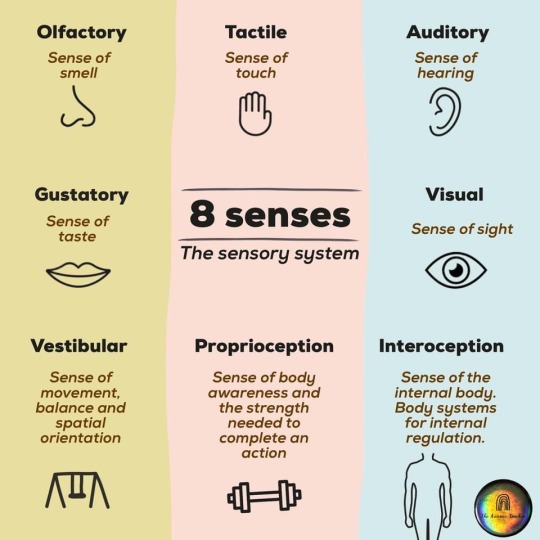
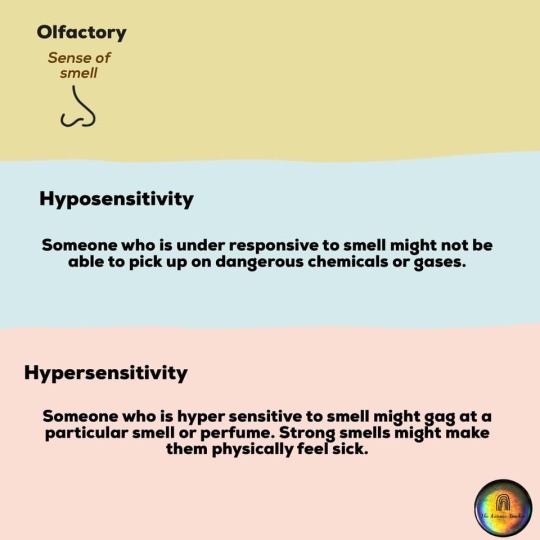

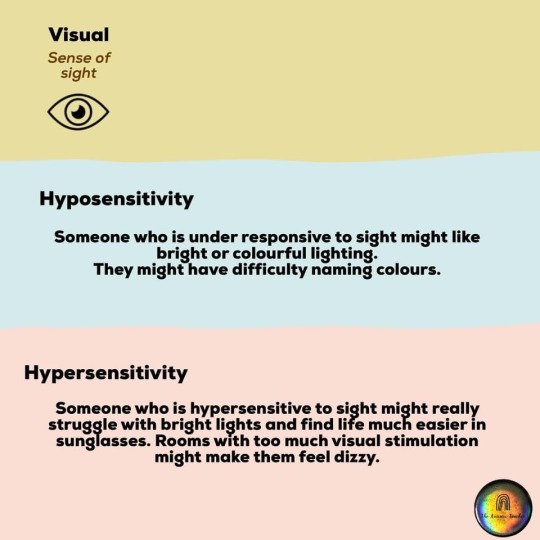
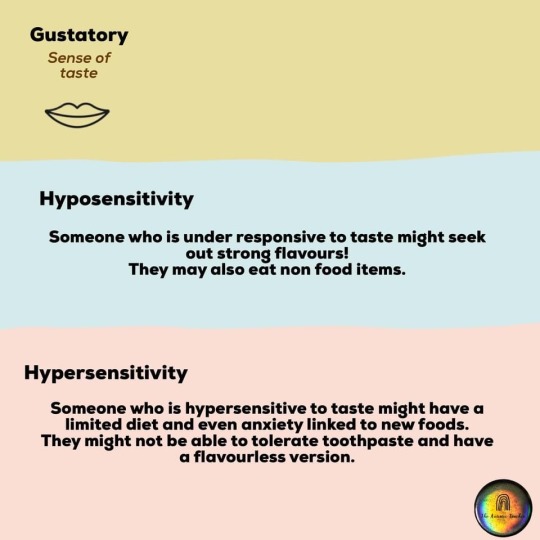
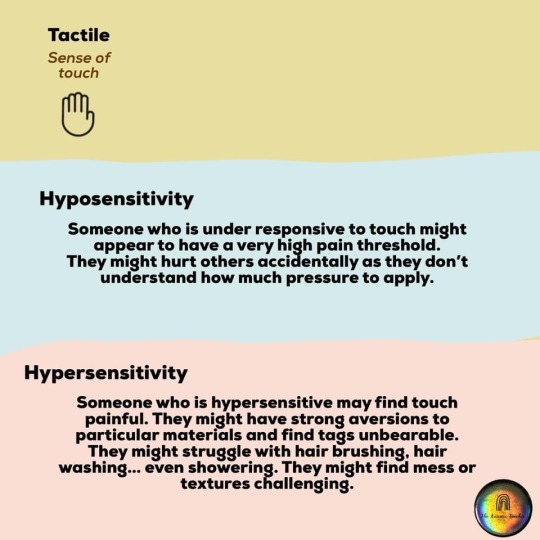
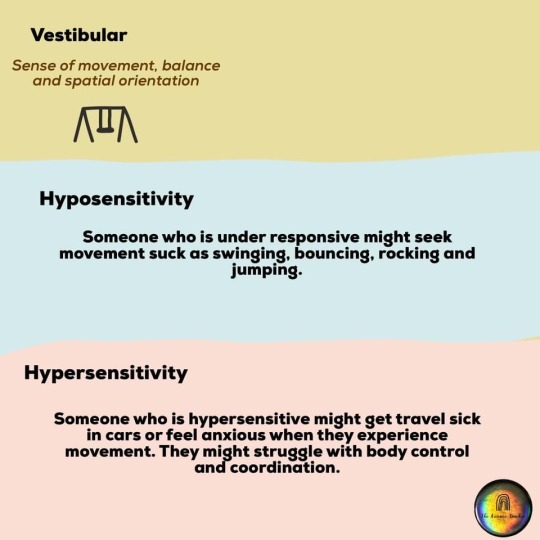
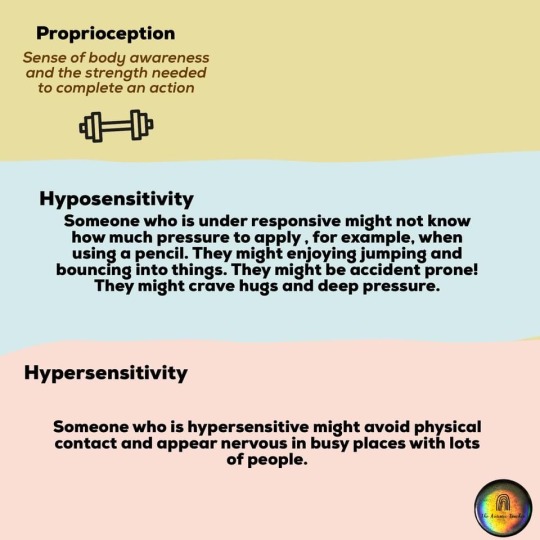
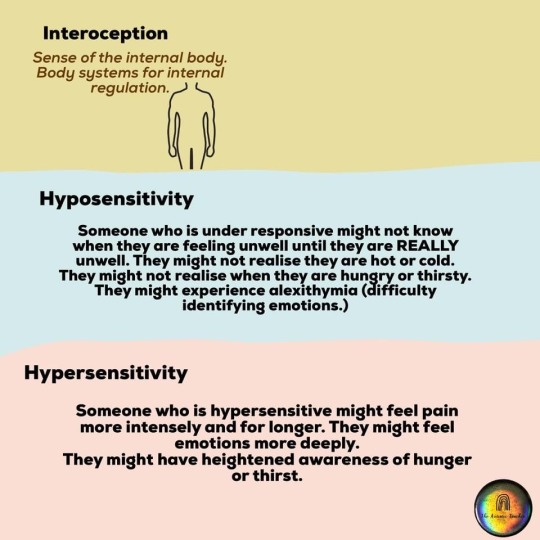
Text will be below:
Olfactory:
Sense of smell
Hyposensitivity:
Someone who is under responsive to smell might not be able to pick up on dangerous chemicals or gases.
Hypersensitivity:
Someone who is hyper sensitive to smell might gag at a particular smell or perfume. Strong smells might make them physically feel sick.
Auditory:
Sense of hearing
Hyposensitivity:
Someone who is under responsive to sound might not notice quieter or background sounds.
They might seek out loud noises or music.
Hypersensitivity:
Someone who is hyper sensitive to noise might find loud noise painful. Lots of different noises can also be challenging even if they are at a lower level.
Visual:
Sense of sight
Hyposensitivity:
Someone who is under responsive to sight might like bright or colourful lighting.
They might have difficulty naming colours.
Hypersensitivity:
Someone who is hypersensitive to sight might really struggle with bright lights and find life much easier in sunglasses. Rooms with too much visual stimulation might make them feel dizzy.
Gustatory:
Sense of taste
Hyposensitivity:
Someone who is under responsive to taste might seek out strong flavours!
They may also eat non food items.
Hypersensitivity:
Someone who is hypersensitive to taste might have a limited diet and even anxiety linked to new foods.
They might not be able to tolerate toothpaste and have a flavourless version.
Tactile:
Sense of touch
Hyposensitivity:
Someone who is under responsive to touch might appear to have a very high pain threshold.
They might hurt others accidentally as they don't understand how much pressure to apply.
Hypersensitivity:
Someone who is hypersensitive may find touch painful. They might have strong aversions to particular materials and find tags unbearable.
They might struggle with hair brushing, hair washing... even showering. They might find mess or textures challenging.
Vestibular:
Sense of movement, balance and spatial orientation
Hyposensitivity:
Someone who is under responsive might seek movement suck as swinging, bouncing, rocking and jumping.
Hypersensitivity:
Someone who is hypersensitive might get travel sick in cars or feel anxious when they experience movement. They might struggle with body control and coordination.
Vestibular:
Sense of movement, balance and spatial orientation
Hyposensitivity:
Someone who is under responsive might seek movement suck as swinging, bouncing, rocking and jumping.
Hypersensitivity:
Someone who is hypersensitive might get travel sick in cars or feel anxious when they experience movement. They might struggle with body control and coordination.
Interception:
Sense of the internal body.
Body systems for internal regulation.
Hyposensitivity:
Someone who is under responsive might not know when they are feeling unwell until they are REALLY unwell. They might not realise they are hot or cold.
They mist might experience cleathymiu/difficultirsty. identifying emotions.)
Hypersensitivity:
Someone who is hypersensitive might feel pain more intensely and for longer. They might feel emotions more deeply.
They might have heightened awareness
Link to post
#the 8 senses#smell#touch#auditory#taste#visual#vestibular#interoception#proprioception#source: the autistic teacher (facebook)#feel free to reblog/share
159 notes
·
View notes
Text
KELDEORIN'YAA WORD OF THE DAY

KIV - CHILD, YOUNGLING
I am a teacher. I think it shows sometimes.
So, hear me out...
Kel' Dor infants are incubated in a marsupial-like brood-pouch for 4 months till they emerge in what is called their "Emergence Celebration." (They actually hatch in the brood-pouch). There was a time when the eggs were taken out and incubated (in the distant past). On their inimical world though, this proved too dangerous for the offspring (Momma Kel'Dors are EXTREMELY protective).
Sometimes (due to marsupiod trauma of some sort like a bump/ massive jarring/trauma to the mother) a little one will opt to delay emergence. I say "opt," because in adulthood many of these children will tell you that is exactly what they did. They needed some more time of empathic safety and quiet space, till Momma could telepathically coax them out. Her body is so closely intertwined with theirs (with not one BUT TWO umbilicus - one for waste and one for sustenance) that only when the child consents are the cords detatched - and Baby emerges to see what's for lunch.
Poor Momma gets pretty big when this happens, as you would expect - but not as big as you might think (because Kel' Dors stay pretty small to fit while they're in there, and then undergo a MASSIVE growing spurt when they're out). However -
Their growth spurt is not as extreme. instead, they take their time as much with that as anything else. As they grow there are telltale signs in their morphology. Their heads are larger, with smaller eyes, taller craniums and lower-set kolmi (sensory horns... Levin'yaa, as some other races call them). They are thinner than other kids but have a ravenous appetite when they eat. They are hyper-sensory and start at the smallest things... particularly auditory stimuli (it has been put forth that in some cases there may be a sensory sensitivity issue at play with these kids - and they are born having a hard time with noise. This has not been conclusively proven). Mentally, they are typically sharp as a tack and often mathematically inclined (it is a fallacy that they experience universal mental delays). Eventually they catch up in all ways to their peers... and many very important Kel' Dor were in fact late-emergers in their infancy.
Plo Koon was one :)

This is an original character of mine who is a late emerger. Her name is TORN LI. She is beloved by her friends and peer group, and fiercely defended from bullies (yes- there are some. Like everyplace).

She is the math whiz who will happily help anyone with their homework, and loves her friends to a fault. She has issues with being hyper-sensory and is easily startled (she loves SIM the troublemaker, but HATES that he is noisy and shrinks whenever his loud voice is around).
I love that her world ADORES and supports these little ones and they all have kinds of advocates and emotional supports in their early life - from their momma and siblings, to the school system and their network of friends. It's really sweet.
( I have a story on the burner of the sometimes humorous form "emergence" takes if it happens, say, in a supermarket or a restaurant. It's kind of an ordeal... but a happy one for all involved. Stay tuned!)
Many thanks, as usual, to @plokoonsdisapprovingeyebrows for the terrific Keldeorin'yaa Conlang Dictionary, which you can find here:
keldeorinyaa conlang dictionary - Google Sheets
I love it - and you will too.
#kel dor#plo koon#star wars fan art#star wars fanfiction#maskless kel dor#dorin star wars#plo koon simps unite!#plo koon fan art#planet dorin#kel dor lore
14 notes
·
View notes
Text
Hyper-Sensory Perception Disorder (HSPD)

Hyper-Sensory Perception Disorder (HSPD) is a condition characterized by an individual’s heightened sensory perception beyond normal human capabilities.

Subtypes
Selective HSPD: Individuals experience heightened sensitivity in one or two senses.
Generalized HSPD: Individuals experience heightened sensitivity in all five senses.

Symptoms
The primary symptoms of HSPD are extreme sensitivity to sensory stimuli, including:
Auditory Hypersensitivity: Heightened hearing can lead to discomfort or pain in loud environments.
Visual Hypersensitivity: Increased sensitivity to light can cause discomfort in bright environments and difficulty adjusting to changes in light.
Olfactory Hypersensitivity: Enhanced sense of smell can lead to nausea or discomfort due to strong or unpleasant odors.
Gustatory Hypersensitivity: Heightened sense of taste can alter dietary habits due to intense flavors.
Tactile Hypersensitivity: Increased sensitivity to touch can make certain textures or temperatures uncomfortable.

Criteria
Diagnosis of HSPD would be based on the individual’s self-reported experiences, clinical observation, and exclusion of other medical conditions that could cause similar symptoms.

Potential Impact
The heightened sensory perception associated with HSPD can lead to sensory overload, causing discomfort, anxiety, and difficulty navigating environments with strong sensory stimuli. It may also impact an individual’s social interactions and daily activities.
18 notes
·
View notes
Text
('▽') Happy Autism Awareness Month!
I'm honestly floored I managed to keep this shtick going long enough to celebrate the occasion... even if it is in a fairly odd and obscure way. Nevertheless, good tidings to all, be you autistic or just supportive!
Since this page has a gimmick that I am more than happy to fulfil (and we happen to be in an all too befitting time to do so), allow me the chance to gush about something that has kept the Ace Attorney series and Athena Cykes specifically so thoroughly lodged in my brain.
So, the idea that Athena Cykes is an autistic-coded character is nothing new - it's a popular-enough sentiment in the fandom from what I can gather - but it's one that produced enough interest in me to start an entire page dedicated to collecting thoughts and ideas around this character and any adjacent content. Naturally I have to stop and talk about it for a while, and why it's important enough to me to warrant such a reaction.
Let's start off by setting the groundwork, shall we? Why exactly do I think this? "Evidence is everything" after all!
Buckle your knuckles, there's PLENTY of it to go around!
('◡') Disclaimer: I am about to compare traits of a real-world disability to a fictional character that may or may not have been written as such with any intent or comprehension. In fact...
(°o°) I'm not entirely sure if it WAS intentional or just a consequence of Ace Attorney being a larger-than-life series!
(≻⁓≺) I am liable to make mistakes here!
('◡') So give me a nudge if you think something's off or if I missed an important detail!
Exhibit A - Sensory Processing Issues
Athena Cykes' main "gimmick" in Ace Attorney is a heightened sense of hearing. She is highly sensitive to tone of voice and has better than average hearing overall. It also means loud or grating noises are amplified to the point of being painful to hear(as with opening the door to Tenma Taro's Chamber below).
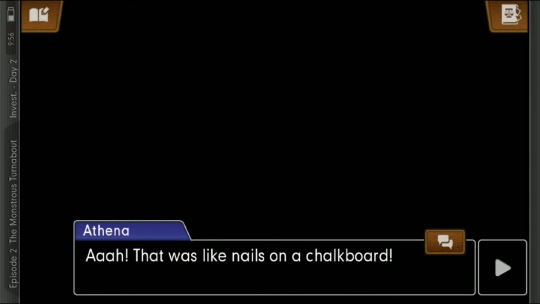
This trait is often a blessing and a curse for her; it enables her to do things that most of the cast can't, but also proves distressing in cases where noise becomes too much to bear. See Sahdmadhi turning her hearing against her in Turnabout Storyteller.
(⳻_⳺) Dick move by the way!
Abnormal sensory processing - especially hyper-sensitivity - is a symptom of autism likely caused by altered/excessive connections in the brain, effectively over-tuning your ability to process stimuli. A good example of this in reality is being sensitive to the texture of clothes or food, or being more strongly affected by loud noises (similar to Athena here). As with Athena, it can be advantageous, but is more often than not an impairment to our ability to function in everyday life.
Which handily leads us to why this is problem for both the character and anyone with sensory processing issues...
Exhibit B - Overstimulation
Athena was often overwhelmed by her hearing as a child (and even occasionally as an adult, though with a less severe reaction), usually resulting in her breaking down and crying from the abundance of auditory stimulation. She couldn't be in crowds or even attend school for too long without it affecting her. That point especially I'm sure is relatable to most of us with ASD!
She doesn't have the same loud meltdowns in adulthood, and the trauma of UR-1 makes her breakdowns just as understandable without being autistic (though any emotional processing issues wouldn't help!). Regardless, it was a significant enough problem in her childhood to stifle her social development and attendance in education, resulting in a fairly sheltered lifestyle in Metis Cykes' care.
Speaking of Metis, two of her inventions were made with the intent of helping Athena cope with her atypical traits. The first being a set of noise-cancelling headphones that helped dampen the emotional noise her abnormal hearing picked up involuntarily. Granted, it wasn't perfect, but an honest effort was made to help! The other we'll get to in:
Exhibit C - Social Impairment (Withdrawn Behaviour, Emotional Processing etc)
Athena was incredibly quiet and withdrawn as a child, and wasn't good at talking to others when she did speak. She isn't incapable of affection, but it's largely non-verbal. Her mother created and gave her Widget as a way of broadcasting her thoughts & simplifying "emotional noise" to better explain herself to others. As it reflects her thoughts, with most things Widget says being somewhat childish (calling Gaspen Payne an "arrogant jerk" and being generally immature), it can be assumed Athena's thoughts are roughly as mature. Not that her actions are any less so - she often behaves that way as well! We can give her some leverage, being 18-19 in the games she's appeared in, but autistic people tend to have a reputation for acting childish or having childish interests.
This also means we tend to be infantilised by others.
Athena's not much different: see the cop that badgered her over looking like a highschooler and not letting that initial impression go, despite being shown her badge.


Her being 18 and reactionary responses to this obviously weren't helping her image, though it's fair to say we're supposed to be on her side on this.
(The subsequent tossing of said cop I've already discussed, albeit in an older post, and it's not terribly relevant to this one. Onwards and upwards then!)
When she became more extroverted, she shows herself as incredibly transparent in terms of her emotions, often having trouble masking her feelings. Body language is large and loud (this IS Ace Attorney though, everyone's a little obnoxious!) with the closest match in intensity being Bobby Fulbright. Who is perhaps the loudest and most emotional character in the series.
ASD is defined as a developmental and social impairment. People with it are often known for being quiet or otherwise not particularly sociable. It also means we have problems communicating ourselves to others - either due to missing social cues, not picking up on things that aren't explicitly stated, or simply not being able to word ideas in a way that makes sense to others. This also creates problems with emotional processing. It isn't the same for everyone, but in my experience it can be summed up as "your emotions are too big for your body". ie stifled emotional development results in less subtle and more physical displays of one's feelings.
While she has overcome a lot of her shyness and anxiety as an adult, there are plenty of times where she stammers and struggles to get her words out or needs more time to think something over. She often struggles explaining her reasoning for her objections in court even if she's on the right track, that age-old nightmare of having to verbalise your thought-process is a consistent challenge.
Exhibit D - Hyper-fixation/Special Interest
Athena is strongly fixated on analytical psychology, bringing it up at frequency when the opportunity arises. The topic is constantly on her mind and one she's beyond capable of discussing in great detail with little prompting required. It forms the way she views others and the world around her, is her main tool in court, and a framework she often tries to put most things she encounters into.
People with autism get deeply invested in a topic or topics that interest them. More often than not, these topics are something that we can (and will!) gush about for hours on end if allowed to. Unfortunately - due to the next point I'm about to go over - we also tend to get stuck on the subject for long periods of time. Talking about, researching or just thinking about fixations is an enjoyable experience for those on the spectrum. Look at any time Athena Cykes gets to talk psychology and you tell me she isn't enthused every time!
('▽') It's kind of infectious!
But potentially exhausting for anyone who doesn't share the same interests or have enough patience for it. This is why we worry about being annoying about a fixation at times!
Exhibit E - Routine & Repetitive Behaviours
My main evidence here is the Swashbucklers Spectacular - watching it on repeat to the exhaustion of Apollo and staying up late to do so again later that same day. It's an activity she describes as "therapeutic" (which leads to her explaining that animal therapy is a proven type of therapy. When Athena can, Athena will!).


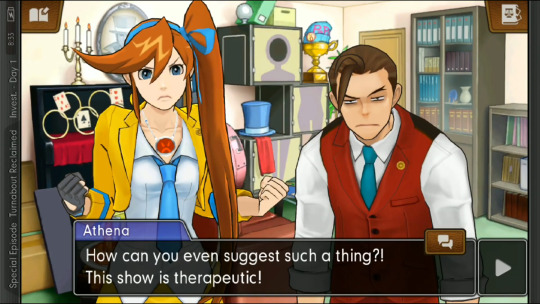
Repetitive or familiar routines/actions are a fairly well-known trait of those with ASD. While it can make them appear monotonous, there's a good chance it's tied to stimulation; since the brain is "over-tuned" to process sensory information, repetitious actions provide controlled & familiar stimuli that isn't likely to bother you. It also means we tend fixate on things that make us happy as mentioned before.
('◡') If anyone relates to listening to just 1 song ad-nauseum, you get what I mean!
(Slight stretch, but her enthusiasm for physical exercise could also fall under this category, as it often involves repetitive motions - think stimming but more rigorous! Running around the courthouse may also be a way of venting excitement/anxiety. Take this with a grain though!)
Exhibit F - Empathy
Had trouble empathising/relating to her mother (though she never made it easy either). Often treated machines like people and thought people could be fixed like machines. A sheltered life on top of a social development impairment handily explains this.
Later, once she became more extroverted, her empathy turns out to have been over-tuned rather than muted. Likely a good reason why she got overstimulated so often, being flooded with people's emotions that, as a child, she did not fully understand.
That said... she does still have trouble telling what's human or not from time-to-time, albeit much less so (despite falling from a box of props, she still mistakes this prop for a human child).

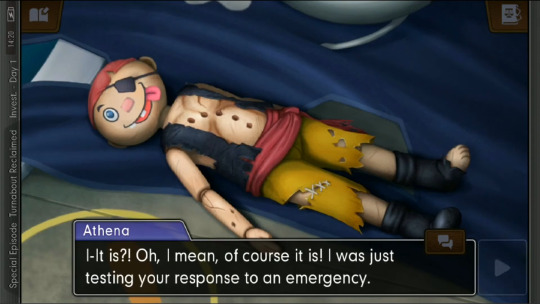
In short, she struggles to relate to other people and humanises non-human objects/machines to an unusual degree. The latter could also be tied to high-empathy; that is, a person with ASD would experience empathy so strongly that it applies to non-human things or animals.
(Admittedly, some of that comes from personal experience; I prefer escorting insects out to killing purely because I don't enjoy the prospect of potentially inflicting great pain trying to kill them quickly and failing. Over-tuned empathetic responses will do that.)
Exhibit G - Masking
An excellent point was raised by @wyrmswears in response to this post. So, in-brief!
Athena's perky personality could be a result of masking. It's a term generally used for actions or behaviours taken to "mask" one's personality traits - in this case, to hide behaviours that arise from autism. This is typically done in response to social pressures, as a coping mechanism, or in response to trauma.
Athena feels a great deal of pressure to appear a certain way. We've already covered her conversation with the cop in The Monstrous Turnabout and subsequent events demonstrate that she's very concerned with how she's perceived (heh) by others.
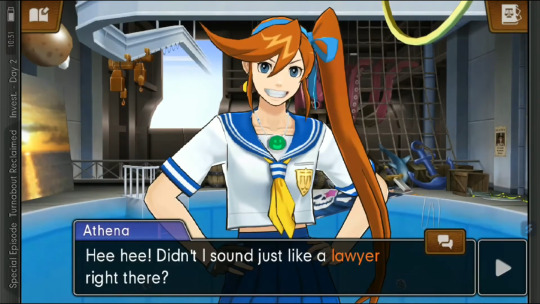
Particularly, she's worried about looking capable and in a way that fits her job as an attorney. This aspect of her character is made apparent and reinforced multiple times early in the game. It also serves to deflect from those anxious thoughts and emotions (though not too well, given her earnestness).
It's worth noting that a focal point of Athena's trauma is not being listened to when she testified to Simon's innocence. As stated earlier, masking isn't just used to hide neurodivergent traits - it can be done for any reason to better fit societal expectations of ones' self.
This in mind, I'm happy to concede this as a response to trauma rather than any explicit sign of ASD, even if it fits the interpretation.
Thank you again for calling this to my attention, @wyrmswears!
Exhibit H - Honest to a Fault
We've covered that Athena's emotions are too large for her to hide (on top of Widget's colourful commentary), but characters have noted that she's... very earnest about her thoughts.

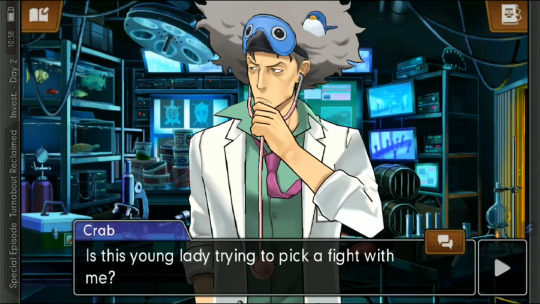

On top of the countless examples of Athena speaking her mind, when it isn't exactly the most appropriate time or place, we can safely say she's very likely to just say things as they are.
People with autism tend to have a reputation for being very blunt or literal when speaking with them. Often, this leads to us saying things that are true, but not taken too well by others (though in this case, Dr Crab is a fairly jaded character as it is). Being explicit with your thoughts is something of a mixed bag; bungling a conversation by being too honest isn't a fantastic experience, but it does mean the people who know you know what's on your mind in uncertain terms. With the right people, it can help heaps (and in Athena's case, it can be endearing to the point of going red in the face!).
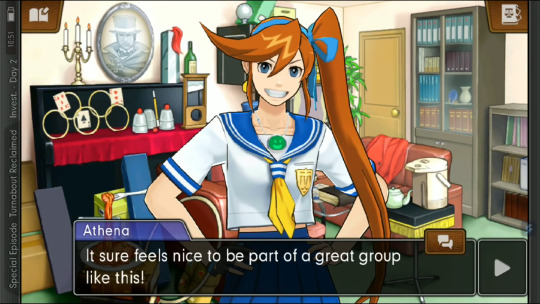


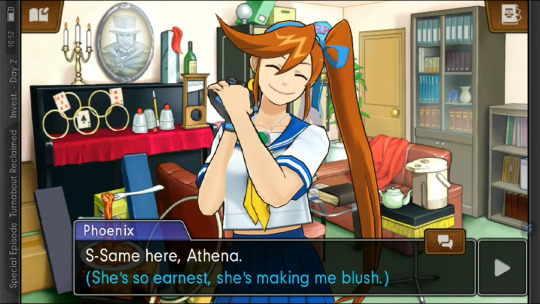
Being honest to a fault isn't a unique trait by any stretch, though an impairment such as ASD can lead to people not picking up enough social experience to know when to reel it back and approach conversations more tactfully. As with Exhibit G, this is a point that stands with or without this interpretation, though worth bringing up regardless.
Is It Good Representation?
Whew, there's a tricky question if there ever was one. Just keep in mind going forward that what I'm about to say are my own thoughts - you're welcome to disagree or provide evidence of the contrary. It wouldn't be fair if it was just me monologuing at you all day, so let your heart be heard!
Now then, whether I think this is good or not...
Athena is a lot of things in Dual Destinies. She's enthusiastic, but impulsive. She's talented, but fumbles often. She's loud and proud, but is often shut down by her impairment or trauma.
She's put in 7 years of hard work to overcome her shortcomings, but continues to by stifled by them in little (and not so little) ways. More often than not, Apollo and later Phoenix need to be there to support her and spear-head a majority of trials in the game.
I've done my fair share of grumbling about Athena's lack of exposure in what is essentially her story. Case 5-1 helped set the groundwork for her, but didn't set high-hopes for how the character would be utilised and explored going forward. She tends to come across more as the new assistant character rather than a new protagonist or defence-lawyer, and that largely comes down to the fact that she needs so much support to keep afloat. This doesn't change too much in Spirit of Justice, where she's allowed her own solo trial but still had Blackquill step into the assistant role for her (I don't plan to talk much about SoJ here... it doesn't do a lot with her that wasn't covered in DD, save for the confidence boost).
Oddly enough, I'm fine with all that for the most part.
Really, I am!
Let's be fair, she had a lot of developmental issues as a child and had gone through the horror-show that is UR-1 at just 11 years-old. She was emotionally unstable from the start and losing her mother, brother-figure and home in essentially the same day left a gaping wound on an already vulnerable child.
And in 7 years, right at the threshold for adulthood, she has come a LONG way from where she was. Her outgoing personality and empathetic nature have flourished from her continued attempts to break out of her shell. She's picked up on 4 European languages during her time on the continent. Her rigorous study in analytical psychology and law had landed her a career as an attorney at 18! And it all happened because she makes an active effort to overcome her barriers: be it her communication problems or her fear of courtrooms.
But she isn't completely free of it all. She will always be a little confused or will fumble talking to people, and until the end of Dual Destinies, UR-1 continues to have a profound effect on her ability to perform as an attorney.
Let me make this point as clear as I can. Athena Cykes doesn't have constant support from others because she's untalented or stupid. She has support because she needs it.
And that's fine.
That's Cool, but Why Does This Matter?
The reason all this matters to me is that, as an autistic person myself, it's important to recognise that you're going to need help. It's not something you just "grow out of" or "get better from" - it's just part of who you are, both the ups and the downs. Accepting it as a facet of yourself, rather than some demon to be conquered, is important if you want to live comfortably with it.
It's going to sound bloody baffling of me to say, but this character and how they could exist as a representation of an autistic person has helped a little with that. Having a character that is talented and intelligent who is enabled to be so under their own power and with the help of others around them... well, it got to me, as I muddled through what has been a troubling few years in adulthood.
Not one to air my dirty laundry out on the world though, so I'll spare you the details!
For now, I'll leave you with my ultimate summation.
('▽') I just think she's neat. <3

#ace attorney#auticykes#athena cykes#thena thoughts#autism#for the record! there should be a reblogged post below listing charities for autism - both good and bad#figured i'd give the good more exposure on my dumb AA page to pair with this rambling essay
85 notes
·
View notes
Text
Did you know that mental illnesses/disorder other than schizophrenia and bipolar disorder can cause hallucinations??? I know that sounds crazy but hear me out 😅🤣
I have an intense combination of Premenstrual Dysphoric Disorder (PMDD) , ADHD, and Sensory Processing Disorder. However, for years, I was misdiagnosed with Bipolar Disorder and over medicated. This caused my hallucinations to get worse, and doctors couldn't understand why. After years of therapy, correct diagnosis, and proper medication I've discovered my hallucinations stem from an entirely different mental pathway.
PMDD is caused by the brains over sensitivity to Estrogen and Progesterone. The fluctuations in these levels causes a severe depression the week leading up to menstruation (bleeding). The depression is debilitating and often leads to suicidal ideation. If you have OCD (like me), it will also make these symptoms worse. Once bleeding begins, both of these hormones sharply drop off in the body. For me this causes what I call "the flip"
"The flip" is when my depression disappears and my ADHD/sensory issues quickly and sharply spike. My brain will start to run in overdrive. I will become hyper sensitive to visual, auditory, and tactile sensory stimuli. This is where the hallucinations come in.
When my visual sensory stimuli hits me too hard I start to see "shadow people" in my peripheral vision. Black foggy shapes that seem to run around behind me like people stalking me. I'm not seeing things that aren't there, my eyes are just picking up on extra details and when it can't sense the details it makes up stories about why it can't see the details 😅
When my auditory sensory stimuli hits me too hard I hear things that other people don't. Turns out I'm just hearing the whine of electricity or sounds from higher pitch or lower pitch frequencies that most people can't hear. According to the audiologist i went to for testing, I an able to hear a higher range of frequencies than most humans can at volumes lower than most humans. So the voices and sounds I was hearing were real sounds, but only I could hear them 😅
When my tactile sensory stimuli hits me too hard, I think I have bugs crawling all over me. I will start slapping and swatting away bugs that aren't there. Turns out it is just the hair on my legs and arms that I'm feeling 🤣 when I shave the hard off my entire body the feeling of bugs goes away.
Because I was misdiagnosed and over-medicated, my brain chemistry is permanently messed up. The medication made my hallucinations WORSE, and they really never got better even after stopping medication. This is similar to hallucinations induced by the abuse of hallucinogenic drugs.
I just want to encourage people to express caution when dealing with and treating hallucinations. Currently the DSM-V reserves hallucinations for very specific disorders, but little consideration is given to how multiple different disorders can interact to cause hallucinations!
#schizophrenia#bipolar disorder#premenstrual dysphoric disorder#adhd#actually adhd#actually schizophrenic#actually bipolar#sensory issues#sensory processing disorder#hallucinations#mania
4 notes
·
View notes
Text
VISUAL STIMMING AND AUTISM
–Triveni Goswami Vernal Registered Special Educator (A64010)Stim refers to self-stimulatory behaviour that an individual on the Autism Spectrum often engages in, to help cope with the sensory dysregulation that they experience.In the previous blogs, I had touched upon Auditory stims and the forms it takes when an individual is hyper-sensitive or hypo-sensitive to incoming auditory information. In…

View On WordPress
0 notes
Text
My autistic social engagement system is not dysfunctional.
My social engagement system hears every nuance in your voice, tracks your body language, and builds a complex editable picture of who you are as a person.
My social engagement system easily attunes to animals, children, and safe people.
On a regular basis, my social engagement system allows me to offer empathetic support for my friends and family’s day to day stresses.
Before covid, my social engagement system allowed me to dance with large groups of people without experiencing any anxiety.
My social engagement system perceives when others are socially engaged and when they are masking or fawning.
My social engagement system notices what I need and enables me to set boundaries which keep me safe.
When I appear to be avoiding socialization, I’m actually protecting my internal social engagement from external threats. (Have you ever left a party early because you didn’t want to keep pretending to enjoy yourself?)
In addition to having a hyper-functional sense of sound, taste, and smell, my social engagement system may have senses that you don’t have or haven’t accessed.
My social engagement system can sense the emotional information passed in the heart-brain magnetic field. (Yes, that's real.)
My social engagement system can “talk” with plants and trees and hear songs in rivers.
I feel the blinding light of a thousands stars if I look straight into your eyes because my social engagement system can see through your eyes into your soul.
I do not struggle to access social engagement.
My autistic nervous system has never struggled to access social engagement in safe settings.
I struggle to access SAFETY.
I struggle to be seen by your social engagement system as anything other than a threat, because I am not normal, and normal feels safe to you.
I struggle to feel safe in clinical environments where you test my body’s responses for presumed dysfunction.
I struggle to process auditory information when two people are talking at the same time because my social engagement system prefers deep connection over cerebral games.
To you researchers who pre-assume a deficit, the presentation of hyper-function of the social engagement system will never be apparent. You will continue to test for dysfunction and receive results which appear to verify their hypothesis, but you are fundamentally wrong.
The only connection between a compromised social engagement system and the atypical features associated with autism is that most of us have developmental trauma or complex PTSD. When autistic people struggle to access their social engagement system, it is NOT because our nervous systems are inherently flawed, it is because we lack safety.
My autistic social engagement system functions as it was designed to. Even the parts that have shut down to protect me from trauma are functioning exactly as they should. Shutdown of my social engagement system in response to trauma or lack of safety is not dysfunction.
Your attention would be selective too if your social engagement system perceived the nonverbal energetic level of consciousness all the time. If you could sense what I sense, your body would heavily rely on the dorsal vagus programs for disconnection so that you could rest.
If you want to help autistic people access social engagement more often, start with assuming their system is functional and look for the myriad subtle cues in their environment that are screaming “not safe” to a hyper-sensitive social engagement system.
.
.
.
🦋This is an essay titled, My autistic social engagement system is not dysfunctional., which is posted at my blog.
0 notes
Text
SENSORY OVERLOAD
1 Sensory Processing in Autism and ADHD: Studies have shown that individuals with Autism Spectrum Disorder (ASD) and Attention Deficit Hyperactivity Disorder (ADHD) may experience sensory overload differently. These conditions can lead to heightened responses to sensory stimuli like noise, light, or touch, resulting in longer and more intense reactions. This could be visualized in your video through simulations or animations depicting how sensory input is processed differently by individuals with these conditions.(1)
2 Neurological Basis: Research funded by the NIH at the University of Illinois Urbana-Champaign is exploring how genetic factors in ASD lead to auditory hypersensitivity, which is a common form of sensory overload. This study focuses on the balance between excitatory and inhibitory synapses in the brain, which when imbalanced, can amplify sensory inputs such as sound, making everyday environments overwhelming.(2)
3 Sensory Integration in PTSD: Another angle comes from studies on Post-Traumatic Stress Disorder (PTSD), where altered brain connectivity affects how sensory information is processed. This results in difficulties with integrating multisensory input, which can contribute to sensory overload. The research discusses how vestibular function and the integration of bodily senses are disrupted in PTSD, affecting how individuals perceive and react to their environment.(3)
4 Non-Adaptation to Sensory Stimuli in Autism: A study highlighted that some children with autism do not show normal habituation to sensory stimuli. Unlike typically developing individuals who can 'tune out' repeated or continuous stimuli, these children continue to react intensely. This lack of habituation might explain their strong and persistent reactions to environments perceived as sensory-overloading.
ASD and Sensory Overload (4)
Heightened Sensitivity: Individuals with ASD often have heightened sensory sensitivities. They may find noises, lights, or touch to be overly intense or even painful. This sensitivity can lead to sensory overload, where ordinary sensory environments feel overwhelming.
Difficulty Filtering Sensory Input: People with autism may struggle with filtering out background sensory information. For instance, they might find it difficult to ignore background noise that others can easily disregard.
Strong Reactions: The response to sensory overload in individuals with ASD can include extreme behaviors, such as covering ears, avoiding eye contact, or becoming non-responsive as a way to escape the overwhelming input
ADHD and Sensory Overload
Distractibility: Individuals with ADHD are often easily distracted by sensory stimuli. Unlike the heightened sensitivity seen in ASD, this distractibility is more about difficulty maintaining attention rather than the intensity of the sensory input.
Seeking Sensory Stimulation: Contrary to the avoidance behavior often seen in ASD, individuals with ADHD may seek out intense sensory experiences as a way to satisfy their need for stimulation. This can include a preference for environments with a lot of activity and noise.
Variable Sensory Thresholds: People with ADHD may have inconsistent sensory thresholds. At times, they might be hyper-responsive to sensory stimuli, while at other times, they might seek sensory input due to under-responsiveness
Commonality: Both ASD and ADHD involve challenges with how sensory information is processed and regulated. This can lead to difficulties in environments that do not match their sensory needs.
Difference in Response: The key difference lies in their responses to sensory overload. ASD tends to involve more withdrawal and avoidance as a defense against overwhelming sensory input. In contrast, ADHD might involve more seeking and distractibility, where managing incoming sensory information is the challenge.
youtube
this one amazing video that i found which lead me to this idea.
How Media Can Exacerbate Sensory Overload
Information Bombardment: The constant barrage of news, social media feeds, advertisements, and notifications can overwhelm anyone's senses.
Multitasking Culture: Media often encourages simultaneous multi-device usage, fragmenting our attention and contributing to sensory overload for those susceptible to it.
Distorted Reality: Social media's emphasis on highlight reels and filtered images can raise unrealistic expectations, contributing to stress and a feeling of inadequacy that amplifies sensory sensitivities.
Sensory Intensity: Action movies, loud commercials, and attention-grabbing visual design on websites can overstimulate and leave the viewer feeling drained.
How Media Can Help with Sensory Overload
Mindful Media Consumption: Media literacy campaigns can teach how to curate a calmer digital environment, practice disconnecting, and become aware of triggers.
White Noise and Calming Soundscapes: Apps and specialized videos offer white noise or nature sounds to mask overwhelming environments or soothe an anxious mind prone to overload.
Guided Relaxation: Apps, videos, and online resources with guided meditations, visualizations, and breathing exercises can help people learn to self-regulate when sensory input becomes too much.
Educational Resources: Documentaries, explainers, and even social media accounts run by experts can help individuals and caregivers understand sensory overload and find better management techniques.
Community Building: Online forums and groups dedicated to sensory processing disorders provide a vital support system, sharing tips and combating isolation for those who manage these challenges.
1 note
·
View note
Text
HELPING YOUR FAMILY THRIVE!
Flourishing Lives highly trained therapists, create an environment that challenges your child to explore and grow, while having fun, so that your child can learn new things without feeling pressure to perform. You will learn techniques to help your child at home by watching and participating in the therapeutic process.
1 note
·
View note
Text
A Labyrinth of Senses: A Journey Through Autism and Sensory Overload
The world is a cacophony of stimuli, a symphony of colours, sounds, textures, and scents that assault my senses, creating a hyper-real tapestry of perception. Yet, this sensory kaleidoscope can also become a chaotic maelstrom, a whirlwind of overwhelming sensations that threaten to engulf me in a state of sensory overload.
Sensory overload, the term used to describe the state of being overwhelmed by sensory information, is an all-too-common experience for autistic individuals. It is a condition that strikes without warning, transforming the world from a vibrant, stimulating landscape into a disorienting, overwhelming maze.
When sensory overload strikes, it feels like my brain is under siege, a relentless barrage of stimuli bombarding my synapses until they become overloaded. I am drowning in a sea of noise, my thoughts jumbled and incoherent, my emotions heightened, my body tensed and on edge. The world becomes a blur of colors, a cacophony of sounds, a whirlwind of textures and scents, all colliding and merging into a disorienting void.
The physical manifestations of sensory overload are as varied and unpredictable as the experiences that trigger it. Dizziness, nausea, and flushed skin may accompany the onslaught, while muscle tension, headaches, and even difficulty breathing can leave me feeling physically and emotionally drained. My sensory sensitivities can also exacerbate existing conditions, such as anxiety or migraines, creating a compounding cycle of sensory distress.
Over time, I have developed a repertoire of strategies to navigate the labyrinth of sensory overload. Avoidance is my first line of defense, identifying and avoiding potential triggers such as crowded environments, jarring noises, and strong smells. Noise-canceling headphones become my protective shield against the cacophony of the world, while sunglasses shield my eyes from the glare that can trigger discomfort.
Sensory regulation is another crucial tool in my arsenal, seeking out activities that soothe and balance my senses. Calming music becomes an auditory balm, while a warm bath provides a sensory haven. Weighted blankets and fidget toys offer tactile anchors, grounding me amidst the whirling chaos of sensations.
Self-advocacy is essential, communicating my needs to others when I am feeling overwhelmed. I have learned to assertively request breaks, seek out quiet spaces, and employ sensory tools to regain equilibrium.
Self-awareness is my guiding light, understanding my sensory sensitivities and anticipating potential triggers. This vigilance allows me to proactively manage my environment and reduce the likelihood of sensory overload in the first place.
Managing sensory overload is an ongoing journey, a delicate dance of adaptation and resilience. There will be days when the labyrinth of sensations feels insurmountable, when the world becomes a cacophony of overwhelming stimuli. But with understanding, self-awareness, and a repertoire of coping mechanisms, I navigate the labyrinth with a newfound confidence, my path illuminated by the unwavering flame of resilience.

#writing#therapy#essay writing#personal thoughts#personal essay#autism spectrum disorder#autism things#autism awareness#neurodivergent#neurodiversity#short essay#food for thought#sensory overload#sensory processing disorder
0 notes
Text
Introduction
Have you been wondering what ADHD is really like? This will not be biased towards one minority of people who have ADHD. It will be focused on the big picture.
This document will explain the seriousness of ADHD and everything that may come with it. Make sure to do more research into ADHD, as I am not an expert (although I, myself, have ADHD). In this, I go into detail about different aspects of ADHD and why it should not be taken lightly.
What is ADHD?
(Note: Not everyone with ADHD has these symptoms. They can vary from person to person.)
Constant activity going on internally (Hyperactivity)
Hyperfixations
Hyperfocusing
Depression (Co-occurring)
Anxiety (Co-occurring)
Sensory Processing Disorder
Executive Dysfunction
Auditory Processing Disorder (Co-occurring)
Rejection Sensitivity Dysphoria
Insomnia / Sleep issues
Inability to focus
Difficulty switching tasks
Inability to stick to one task
Mood swings
Difficulty regulating emotions
Choice paralysis
Problems with focusing
Poor impulse control
Trouble recalling things, such as commonly used words
Exhaustion levels
Imposter syndrome
Overwhelm
Overstimulation / Sensory Overload
Understimulation
Memory issues
Motivation issues
Time blindness
Poor sense of time
Delayed Sleep Phase Syndrome (Co-occurring)
Extreme boredom
Going into Detail
Executive Dysfunction/ADHD Paralysis:
A feeling of constantly ‘waiting for something’, without knowing what or why.
Confusion as to how to start or do a task.
A feeling of being completely overwhelmed, even by mundane tasks, to a point of being unable to do the task or function.
A very good description of how this can feel is “a fuzzy-restless feeling when you need to do something but your brain won’t focus on anything… you’re silently begging yourself to just do one thing but instead you’re [sitting there] even though you don’t even want to be. It’s like your head is filled with heavy electric cotton… you’re both uncomfortable and unable to stop.”
This is not the same thing as procrastination or laziness. This occurs with tasks that the person is afraid to do, does not want to do, or even wants to do. Laziness means that a person does not feel like doing something, but they could if they wanted to. Executive dysfunction/ADHD paralysis can be described as something a person has been trying to do for [insert amount of time between minutes and months/years], but they physically cannot do the task and end up feeling like a failure because of that. It is debilitating.
Hyperfixation/Hyperfocus:
An extreme obsession over something. This can be creating something, finding out everything about something, or just something that creates extreme emotions in somebody.
This obsession can easily become unhealthy as the person may forget to take care of themselves due to it. However, these hyperfixations cause extreme joy or curiosity in the person.
Difficulty switching tasks:
“When you have ADHD, task switching can often be difficult. You might feel like you're stuck in a gear. It might be you're trying to start, and your gears just keep on grinding. Other times you may want to stop but the gear just stays in place because you're hyper-focusing on whatever you're doing.”
Inability to stick to one task:
People with ADHD often have issues with motivation, which leads to many unfinished projects.
If a task does not give a person with ADHD dopamine, they are often unable to complete the task (i.e. homework; chores).
Delayed Sleep Phase Syndrome:
Instead of having a regular circadian rhythm, with sleeping hours from 11 pm to 7 am, people have an irregular pattern of 2 am to about 10 am.
These times are flexible. However, this means that people with ADHD tend to have issues with falling asleep at a “normal time”.
Extreme boredom:
People with ADHD have issues with dopamine and serotonin.
There are moments when boredom can be painful. People with ADHD can be bored to tears due to extreme emotions and a lack of dopamine.
Time Processing:
If somebody has to leave at 8 am and they wake up at 5:30, they will think that they have two hours or less to get ready. Time seems to pass without a pattern or rhythm.
“Today is Monday, but tomorrow is Tuesday and I have class. After that is Wednesday: I’m having lunch with my mom. Then on Thursday, I have a night class which means it’s basically already Friday and this week is already over.”
Time Blindness:
Not knowing how much time has passed based on their ‘internal clock’; they don’t have one!
Being completely unaware of how much time something will take.
Memory issues:
With ADHD, memory can be greatly affected. Some things will be forgotten very quickly, and some things can be over-remembered.
Difficulty regulating emotions:
“Processing emotions starts in the brain. Sometimes the working memory impairments of ADHD allow a momentary emotion to become too strong, flooding the brain with one intense emotion.” -Thomas Brown, PhD
Brain imaging shows that delayed rewards don’t register for people with ADHD. They are more motivated by the instant gratification that strong emotions deliver.
As a result, a person with ADHD may struggle to deal rationally and realistically with events that are stressful, but not of grave concern.
Motivation issues:
People with ADHD have much lower levels of dopamine than those without ADHD. This causes the brain to constantly crave dopamine.
If a task is not providing the dopamine the brain wants, it will make a person with ADHD less motivated to complete the task, or even start it.
Overstimulation / Sensory Overload:
Information reaching the senses feels like an assault of competing stimuli.
Understimulation:
Outside stimuli are dulled, as if a shade has been pulled over the environment, muting sights, sounds, and touch. These people crave extra stimulation to feel alive.
Exhaustion levels:
Feeling fatigued and tired all the time can actually be related to ADHD. Due to low dopamine levels, people with ADHD can feel exhausted even after getting ample amounts of sleep.
Ironically, people can get bursts of energy from ADHD as well. This can be from hyperactivity or high amounts of dopamine.
Imposter Syndrome:
Feeling like a fraud and doubting your own abilities.
Somebody who is intelligent and who has ADHD can have imposter syndrome towards both. They are not related to each other, but the ways they are portrayed in media causes imposter syndrome.
Auditory Processing Disorder:
Things can take longer to process when somebody hears them than when they see/read them.
The amount or complexity of noise around somebody can affect how they hear things.
Rejection Sensitivity Dysphoria:
Extreme anxiety towards being criticized or rejected by others, despite their relationship with the person.
Extreme pain or emotional sensitivity is caused by a sense of ‘rejection’.
Hyperactivity:
This is not always visible, if at all. There is constant activity going on inside of a person’s head when they have ADHD.
This creates difficulty with sleep and relaxation.
If visible, it usually takes the form of fidgeting or stimming.
“Dealing” with ADHD
ADHD cannot be fixed, but some things can help people work with it. The coping mechanisms vary from person to person, and they aren’t always going to work. Getting diagnosed with ADHD is the best step to take before anything else, as trained professionals can help with ADHD symptoms.
It is important to understand that ADHD is a learning and doing disability. It affects every aspect of life, but it isn’t a bad thing! Many things with ADHD can be positive as well. Hyperfocusing can lead to a lot of productivity! Additionally, people with ADHD are known to be more creative and inventive (according to numerous studies). Empathy and compassion are higher in individuals with ADHD. People with ADHD even have a stronger moral compass!
#actually adhd#neurodivergency#neurodivergent#research paper#adhd post#adhd symptoms#adhd things#living with adhd#adhd problems#info#writing#research
905 notes
·
View notes
Text
thinking about how kris deltarune is autistic thinking about how susie deltarune is autistic thinking about how ralsai deltarune is autistic thinking about how noelle deltarune is autistic thinking about how berdly deltarune is autistic
autistic headcanons for all!!! (a few of these are just observations)
kris-
struggles with displaying empathy
can't really articulate their emotions
hates hates hates eye contact!!! lets their hair cover their eyes for this reason
hates unwanted touch
struggles making connections in terms of friendship
takes things literally
separation anxiety with toriel as a kid, they used to meltdown without her
prized possession is a pair of ear defenders that were gifted by asriel
probably would fixate on true crime
often gets mistaken as rude due to bluntness
primarily nonverbal
susie-
mmmmmm chalk sensory~
also struggles with making connections
victim of the shitty education system not understanding her at all
BIG stims!!!!!!!! very emotive!! headbanging and hand flapping!! teeth grinding :/
her favourite stim toy is a chew necklace that noelle got her (it has to be replaced semi-regularly but her pencils aren't quite as chewed to death anymore)
gets aggressive when overwhelmed :( pushes people away by accident
issues with regulating frustrating emotions
auditory processing issues and poor concentration can make classwork really hard
antagonized due to perceived "disobedience"
lots of executive dysfunction issues
noelle-
is curating an extensive and diverse stim toy collection
struggles with severe anxiety and bouts of depression
sensory issues can be brought on by warm temperatures
disassociates pretty frequently
tends to go nonverbal when stressed
humming and leg bouncing stims!!! she hums christmas songs almost exclusively
diagnosed at around twelve
very into escapism through reading/literature and RPGs
weighted blanket their beloved <3
has a very good memory!!
picky eater
berdly helps her communicate when she shuts down but sometimes he can get a bit carried away
ralsei-
spinning stim!!!!!!!!
hyper sensitive/emotional and hyper empathetic
likes when things fit into rolls and hates deviation from this
enjoys hugs/ pressure for sensory reasons
has a very consistent routine in the darkworld when Kris and Susie arent there
very "black and white" thinking
fears being perceived as annoying :(
full of love <3<3<3<3
excessive apologizing
cannotttttt lie
spends a long time rehearsing conversations
he lets susie pet his fur to calm her down
sometimes doesn't quite understand physical boundaries (hugs without consent) but he's working on it!
his scarf is a really important comfort item to him
berdly-
videogame special interest; particularly into the history of videogame mechanics and other more niche topics. he is rarely given the opportunity to infodump but it's genuinely very interesting
fidget spinner collection B)
struggles with putting himself into others shoes
latches onto people semi intensely
bad at social cues
got diagnosed pretty young
struggles communicating appreciation
he is AMAZING at his job in the librarby, has a very good knowledge of the dewey decimal system
takes his noise-cancelling headphones everywhere, exclusively listens to video game soundtracks
#deltarune#noelle holiday#susie deltarune#kris dreemurr#ralsei deltarune#kris deltarune#berdly deltarune#autistic headcanons#long post#*forces you to pay attention to my hyperfixation*#my stuff#beloved posts
329 notes
·
View notes
Text
A Study of Memes that Resonate
discovering you're autistic
https://www.instagram.com/p/CSj3COxMrpo/
https://www.instagram.com/p/CTzpvvXM9xk/
I came to the realization I'm autistic real late in life. I had a lot of self-doubt at first, especially being self-diagnosed but now it's like shining about so many weird things from my entire life.
the autism spectrum is not linear
https://www.instagram.com/p/CSe9uEqMVMB/
Everyone's pie chart is different.
less talked about autistic traits
https://www.instagram.com/p/CUItf-7PXUK/
My heat sensitivity is off the charts as is my pattern recognition and hyper-empathy.
no, everyone is not "a little autistic"
https://www.instagram.com/p/CVDjPsXAMt9/
https://www.instagram.com/p/CWQ_LLIPS18/
You're not empathizing with me, you're minimizing my experience.
a collection of autism feelings
https://www.instagram.com/p/COgThaNMAQJ/
The whole thing about stepping on a crack. When I was kid, I used to love shifting my vantage points so the edges of things would line up nicely with the lines of other things.
Every autistic person is different
https://www.instagram.com/p/COlQcmAM15n/
https://www.instagram.com/p/CUnJ10ssKCd/
I don't have trouble making eye contact with people I love, especially when I'm in a safe space. And I'm really good at faking eye contact so mostly other people don't notice.
traits people love about me
https://www.instagram.com/p/CO3PybwsD-c/
https://www.instagram.com/p/CQju0N6Mh9W/
Almost every job review I've ever had. The number of times I've been called some variation of a "friendly robot" at work.
good autistic feels
https://www.instagram.com/p/CO6QrFMMRwk/
https://www.instagram.com/p/CTuzcIYMVBh/
Shaving my head is my favorite thing. And there is almost no comfort that matches watching/reading/listening to the same thing over and over again. Sometimes I'll listen to the same song for an entire work day.
things that are autistic culture
https://www.instagram.com/p/CO32M6lMwZO/
Plain food! I could live on rice with a little bit of sauce.
a relatable autism feel
https://www.instagram.com/p/CPJuH8_sdKC/
Which flavor will be the last flavor?
auditory overload
https://www.instagram.com/p/CQOiLiss3st/
Sharp noises (clicking, rattling, etc) are the worst. Intermittent noises are terrible. The best noise is a very loud fan.
life vs tv
https://www.instagram.com/p/CQSkJspsQN4/
I have to guard myself very closely to avoid being overwhelmed by everyone else's feelings.
but you don't look autistic
https://www.instagram.com/p/CQuJECYBDzb/
https://www.instagram.com/p/CRyh5jYsfIo/
https://www.instagram.com/p/CSc0FXHBOi4/
All that means is I can fake being a human well enough to keep from making other people uncomfortable.
Also, what does autism "look like"?
executive dysfunction
https://www.instagram.com/p/CQu8zmiMIAJ/
https://www.instagram.com/p/CRQ83uSMpPF/
I often would like to play video games but can't seem to bring myself to actually play video games.
i can hear electricity
https://www.instagram.com/p/CR62sKUMf7S/
Since I was little, I could tell if a TV or computer monitor had been left on, even if nothing was playing on it.
I can also smell ants.
four moods
https://www.instagram.com/p/CSH4coAsFBZ/
The things I remember are from totally random periods of time and totally random amounts of detail.
on paying attention
https://www.instagram.com/p/CTpTDC1sA7L/
This is where noises really get me. If the noise is uncomfortable enough, I can't focus on anything else.
strange neurotypical norms
https://www.instagram.com/p/CU773xgsU_v/
I always sit on the floor. Furniture is the worst.
autistic love languages
https://www.instagram.com/p/CVBFhhUM59a/
I shower my loved ones with all of these.
13 notes
·
View notes